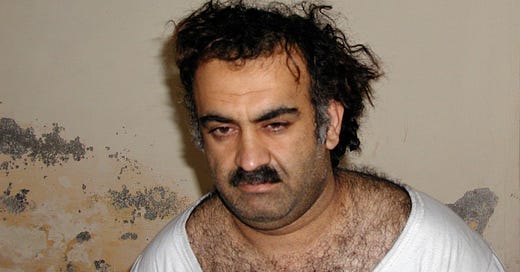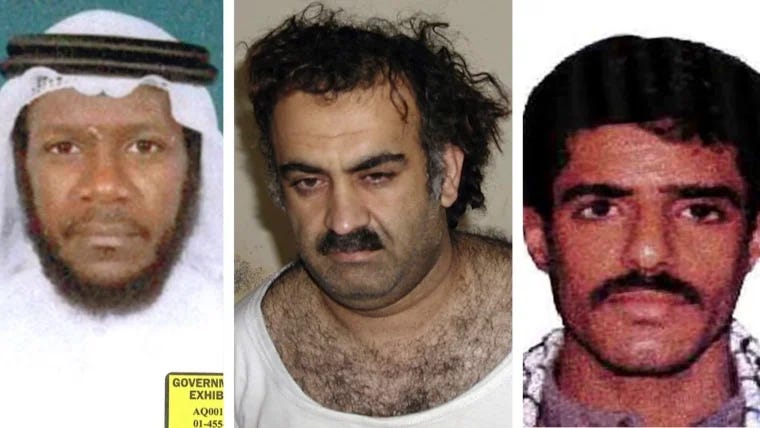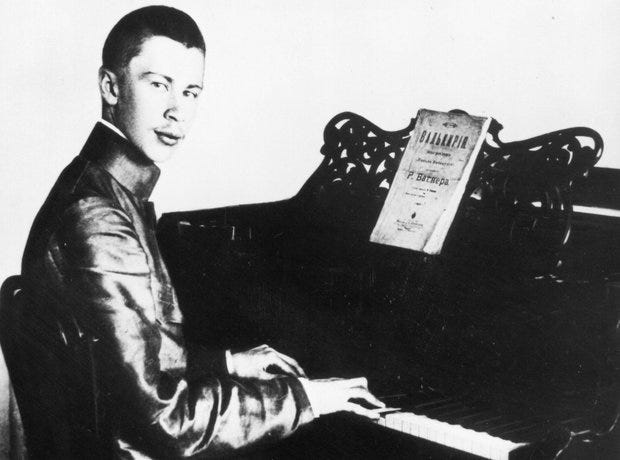Bonus Perspectives: 9/11 Terrorists' Guilty Plea Revoked, Rising Temperatures in Japan, Blade Trilogy, and Prokofiev
Death penalty once again on the table for 9/11 plotters, how to deal with Japan's scorching summer heat, and my current media recommendations.

Bonus Perspectives is a weekly column series containing my thoughts on the latest Western news and Japanese news, as well as film, television, music, book, and video game recommendations. It’s free for all subscribers to this Substack, but if you enjoy my writing, consider opting for a paid subscription. Doing so will give you access to exclusive in-depth pieces and my entire backlog of work. Your support is greatly appreciated!
The U.S. Government Reaches a Plea Deal with the 9/11 Plotters, Only to Revoke It
I’ve been morbidly fascinated by the September 11, 2001 terrorist attacks for the last few years. Born in 1997, I was too young to have any conscious memory of the day itself, but I certainly remember the Afghanistan and Iraq Wars being a constant political backdrop for most of my life. You could not have been an American growing up in the 2000s and 2010s without 9/11 and the War on Terror having some influence on the zeitgeist around you.
Last year, I wrote a piece about 9/11 lost media and why it’s somewhat a topic of obsession for some people like me. Just last month, a video showing new footage of the World Trade Center collapse taken by Japanese tourists was uploaded online. The person who captured it had been sitting on the original analog tapes for years, but it took until 2024 for the video material to be properly digitized for public consumption. 9/11 happened long before smartphones and social media, which means that any new videos or photos are extremely valuable for the purposes of historical preservation.
I bring this up because new 9/11 media would have assuredly been part of the trial of Khalid Sheikh Mohammed and the other living plotters — if that will ever happen. On August 1, news outlets initially reported that the U.S. government reached a plea deal with KSM, Mustafa al-Hawsawi, and Walid bin Attash which would have allowed them to avoid the death penalty. Yet a day later, Defense Secretary Lloyd Austin announced that he was revoking the deal “in light of the significance of the decision.” This brings the 9/11 case back to legal limbo and many including myself doubt that it will ever go to trial.
KSM and other people of interest connected to 9/11 and the War on Terror have infamously been kept at Guantanamo Bay for the last two decades where they were subjected to confessions made through torture. The most recent season of the Serial podcast and the book The Black Banners authored by former FBI Special Agent Ali Soufan do a fantastic job explaining this legally and morally complicated history, so I recommend checking them out to learn the full story. Most legal scholars agree that evidence obtained through torture is not admissible in a court of U.S. law, which is why KSM and co. may never actually be handed down a sentence for their crimes.
As one can imagine, this is a very emotionally-charged subject for the family members of 9/11 victims with responses ranging across the political spectrum. Some are demanding the death penalty for anyone connected to the terrorist attacks, while others simply want legal closure after nearly 25 years. I’m not sure even where I stand on it myself. For the longest time I was against capital punishment since I thought it gave too much power to federal governments, but in recent years I’ve considered it suitable for perpetrators of the most heinous crimes who do nothing for society other than waste taxpayer money while in prison. I certainly won’t lose any sleep if the living men responsible for 9/11 are removed from this earth.
The closest legal precedent we have is the 2006 trial of Zacarias Moussaoui, the only person convicted in a U.S. court who was related to the 9/11 terrorist attacks. The entire procedure was a nightmare, but the jury ultimately decided on life in prison for the defendant instead of the death penalty. Some believed that Moussaoui only had limited knowledge of the 9/11 plot, while others cited his difficult upbringing. It is unlikely that a jury would be as generous to someone like KSM, but even a death penalty verdict would assuredly results in decades more of appeals and decades more of time on death row. Simply put, these 9/11 terrorists are never leaving a prison cell, dead or alive.

One benefit of the Moussaoui trial, however, was the sheer amount of new photos and videos related to 9/11 that had up until that point never been made public. All of them can be found here, though I warn that some of this content is extremely graphic. As I wrote in my 9/11 lost media place, most have only been given a sanitized version of the events and truly do not understand what the implications of nearly 3,000 people being killed in a single day are. If 9/11 happened today, smartphones would surely have captured everything, but the tech world of 2001 meant that almost everything that happened within the Twin Towers is left to one’s morbid imagination.
A trial for KSM and the other defendants would have likely meant that the remaining pieces of 9/11 media still in government possession going public, but we will probably never know what this content is. On a more positive note, more media is supposedly going to be released anyways as the 25-year statute of limitations runs out. Many Gen Z Americans may be struggling to learn about a pivotal event in world history they were not alive for, but newfound enthusiasm for lost media among them is at least a good sign that discourse around 9/11 won’t fade.
Japan Faces Scorching Summer Heat

Japan is burning. Well, not literally, but it sure feels that way if you live here. Of course, it’s not a new revelation to point out that Japan gets extremely hot during the summer. Most of this country falls in the category of the humid subtropical climate, which means that things get very humid. For people from cooler places or even just countries that are dry hot, it can be quite the challenge to get through the summer months if you aren’t used to it.
Japan’s major cities are currently experiencing temperatures at 35 degrees Celsius and above, with some places reaching 40 degrees or higher. We just experienced our hottest July on record, which makes me dread what August will bring. Matt Alt wrote this piece for The New Yorker about Japan’s extreme heat last year, but his thoughts are still completely applicable for the current season. If anything, things just get worse each year as Japan and the world as a whole deals with the effects of climate change.
I’ve lived in Japan for over six years, and this might be my toughest summer yet. I recently started a new part-time job that requires me to stand and move outside for long periods of time. Every day my co-workers and I try to beat the heat with portable electric fans, constant hydration, salt tablets, and handkerchiefs to wipe off sweat, but most of the time we have to be moved indoors to avoid the risk of heatstroke. I also recently took up regular jogging again as part of an exercise routine, but the strong sun and high temperatures mean that I can only run either in the early morning or late evening.
To make matters worse, my air conditioning unit decided to break down on me midway through July. It was a National model from 2005 (Panasonic stopped using that brand name in 2008) and always gave me trouble. By the end of the AC’s lifespan, my room was constantly hovering at around 32 degrees, making it little better than going outside. Luckily, my apartment’s management installed a new AC unit free of charge. My wife and I are back to enjoying cool indoor temperatures, but not having that for weeks in the middle of a brutal summer truly made us appreciate the modern conveniences we take for granted.

Rising temperatures are bound to be another problem Japan faces in the next few decades tied to its aging population. Going back to Matt Alt’s article, heat stroke is a serious threat that kills over 1300 people in this country a year. Most older folks never grew up with air conditioning, and many are stubborn with using it even now. While they also assuredly dealt with heat in their younger years, a look back at archived weather reports from decades ago shows that temperatures were noticeably lower.
Before I came to Japan, summer was always my favorite season growing up in the United States because I generally enjoyed warmer weather. Living here though has completely changed that. I now believe that spring is superior, but that season of mild temperatures feels like it’s becoming increasingly shorter, as is the fall before Kyoto does a 180 going into brutally cold winters. If you choose to live in Japan, the weather is inevitably going to be a trade-off at some point.
What I’m Watching — The Blade Trilogy is the Best and Worst of Pre-MCU Superhero Movies
At this point, I think everyone is now aware that Wesley Snipes returned as Blade for a surprising cameo in Deadpool & Wolverine. In my review of the film last week, I referenced how it was a love letter to what superhero movies were like before the MCU standardized the formula. While most agree that the MCU is currently at a low point (which Deadpool & Wolverine even acknowledges), this of course does not necessarily mean that everything was great before the House of Mouse took things over either.
This became apparent to me when I decided to finally watch the Blade trilogy for the first time. I had always known about them by reputation for years, but never actually got around to them until now. Did I miss out on some hidden classic? Yes and no. While the original Blade is a generally solid action flick and Blade II is even better, Blade: Trinity is symbolic of everything that was wrong with comic book movies until things were set straight with Iron Man in 2008.
Blade was groundbreaking because upon its release in 1998, superheroes were hardly considered viable stuff for serious movies. Failures like Steel and Batman and Robin made the genre feel like a joke, which in a lot of ways lead to a strong counter-reaction in the early 2000s for comic book movies to be drab and serious. For better or worse, Blade arguably started that trend by playing its world straight and star Wesley Snipes upping the cool factor with his slick performance as the titular character. Extremely dated CGI and some cheesy dialogue aside, the film still largely holds up today. I can especially recommend the 4K UHD release for the upgraded picture and sound.

Blade II upped the ante in 2002 due to the auteur style of director Guillermo del Toro, famous for his stellar world-building and creature effects. This sequel has both in spades, which is probably why it’s often considered the best of the trilogy. Some suspension of disbelief is still required to get on board with the plot, but the tight action and strong supporting cast do a great job in elevating the film. Blade II is also notable for being the first Hollywood appearance of Donnie Yen who even directed a few of the action sequences. While Yen has few positive things to stay about the shooting experience in retrospect, it’s a real achievement that this film ultimately came together as well as it did.
Neither film had an easy production, but their problems were peanuts compared to the troubles that plagued Blade: Trinity. Hardly anything here works. The storyline is convoluted nonsense which even has multiple endings floating around, while the editing is absolutely atrocious. I seriously can’t believe that this was the final approved cut. Wesley Snipes is completely overshadowed by the supporting cast and David S. Goyer, writer of the previous two films, ended up in the director’s chair when he really shouldn’t have. Both men had a serious feud on set to the point where Snipes would only communicate with Goyer via Post-it notes, though long-reported rumors of things escalating to physical violence may be a tad exaggerated.
Granted, Blade: Trinity has a few good action scenes and the Ryan Reynolds character is basically a proto-Deadpool. Regardless, it’s clear that Snipes did not want to be here. There was great potential for the storyline to bring things full circle and conclude Blade’s character arc on a high note, but its reputation as the worst in the franchise is completely warranted. As for the future of Blade? The currently-planned MCU reboot has been stuck in development hell for years and most fans have little faith that it will do the character justice. Let’s hope we can be proven wrong.
What I’m Listening To — Prokofiev is One of the Most Underrated Composers

My late father was a violinist for the Pittsburgh Symphony Orchestra, which is how I ended up playing the violin throughout most of my childhood. After my parents divorced when I was ten, I’d spend a couple days a week at his house for violin lessons. Since most kids hate doing stuff they’re made to do, I never really enjoyed it that much until I became a major part of my high school’s orchestra. Like my father with the Pittsburgh Symphony, I was assistant concertmaster and very occasionally first chair. This meant I had to practice more than the other students and by the end of my senior year I did a solo performance of John Williams’ Schindler’s List theme.
I stopped the violin after that when I entered university and haven’t touched it since high school. Perhaps I’ll pick it up again as a hobby one day to honor my father, but for the time being my interest in classical musical is strictly from the listener’s perspective. Through my father’s work, I had the privilege of hearing some of the best music ever composed by some of the best musicians in the world. I also had a chance to meet artists like Chicago’s Peter Cetera and even John Williams himself, but those are stories for another time.
One of my biggest regrets is that I didn’t attend more of my father’s concerts when he was still alive, but I’ve been trying to make up for that over the last few years by listening to more classical music. While I of course love the masters like Mozart and Beethoven, one of my all-time favorites is Sergei Prokofiev, a composer who I don’t think has received enough of his dues in the public consciousness. In the future I might dedicate entire articles to musical artists whose work I’m passionate about, but for the time being I’ll post my recommendations here.
When people think of Russian composers, Pyotr Tchaikovsky, Igor Stravinsky, Sergei Rachmaninoff, and Dmitri Shostakovich are likely to come to mind first before Sergei Prokofiev does. I find that to be a shame though, especially because Prokofiev serves as an important bridge between 19th century and 20th century sound. Born in 1891, his pianist mother Maria raised him on Chopin and Beethoven, but Prokofiev later developed a reputation for pushing musical boundaries and experimenting with new forms composition.
Most today will immediately recognize the “Dance of Knights” movement from Prokofiev’s Romeo and Juliet ballet, which carries a memorable melody that sounds downright cinematic. While it can be hard for newcomers to classical music to adjust to the styles of old composers, Prokofiev remains very accessible because of his approach to pleasing melodies that carry the overall themes of his work. He was also notable for being one of the earliest composers of film music at a time when the medium was just transitioning into sound. Prokofiev’s score to the film Lieutenant Kije sounds like it could have been made for a modern movie, while one of its themes even later became the backing track to Sting’s “Russians.”
Perhaps my favorite Prokofiev works are his two violin concertos which remain absolutely stunning over 100 years after they were originally composed. David Oistrakh’s performance comes highly recommended and one doesn’t have to be a violinist to see how technically challenging these solo passages are. All of this just scratches the surface of what Prokofiev achieved and I haven’t even discussed his operas like The Gambler and War and Peace, which many rank as his greatest achievements. For the time being though, I recommend starting with these to get into the world of Prokofiev:
Romeo and Juliet Suite — Radio Filharmonisch Orchestra
Lieutenant Kijé Suite — London Symphony Orchestra
Violin Concerto No. 1 — David Oistrakh and the London Symphony Orchestra
Violin Concerto No. 2 — David Oistrakh and the London Symphony Orchestra
Piano Concerto No. 2 — Nikolai Lugansky and the Orchestre philharmonique de Strasbourg
What I’m Reading — The Ipcress File is a Thrilling Spy Novel by Len Deighton

Everyone knows James Bond and Ian Fleming, but far less know Harry Palmer and Len Deighton. While 007 is considered to be the main pillar of spy fiction, Deighton’s novels are largely viewed as the more grounded alternative with complex plots and deep research. Published in 1962, the same year Dr. No hit cinemas, The Ipcress File was the debut novel of a man who originally never intended to become an author.
Len Deighton, who amazingly is still with us at age 95, worked as everything from a cook to an air steward before The Ipcress File turned him into a bestselling writer. His main profession had primarily been art, being most famous for inventing “cookstrips” that offered recipes with easy-to-understand illustrations in a comic strip-like form. The Ipcress File began as a casual writing project in 1960, partially inspired by Deighton’s own globe-trotting travels. A literary agent friend liked what he read and succeeded in getting the novel published in 1962. After an initial print run of 4,000 copies vanished off shelves immediately, it went on to sell 2.5 million copies in three years.

The Ipcress File proves to be a fascinating Cold War thriller that puts the unnamed spy protagonist in the middle of a conspiracy between world powers. Loyalties are constantly questioned, promising leads go nowhere, and everyone is suspect. The novel is told in the format of a report to the British defense minister, so we as the reader know that our hero somehow does survive everything thrown at him, but how he gets to the end of the mystery is where the real fun lies. The plot is very complex, with Deighton accurately showing that real espionage is hardly a straightforward affair from Point A to Point B.
I have not yet seen the film adaptation of the novel starring Michael Caine or the more recent 2022 television drama version with Joe Cole, but from what I gather both are very compressed takes on Deighton’s labyrinthine writing. The medium of cinema necessitated that the protagonist be given a name, so Caine and producer Harry Saltzman (who also was behind the James Bond films) settled on Harry Palmer. Deighton went on to write multiple sequels to The Ipcress File which all feature unnamed protagonists, but it has been debated if they are even the same person.
In addition to his Harry Palmer novels, Len Deighton wrote many other spy books, war thrillers, and even non-fiction works on military history. It’s literature I certainly plan on getting to and will hopefully cover in later editions of this column. The author himself though has traditionally been somewhat of an introverted recluse, rarely giving interviews and deciding to retire from writing entirely in 2016. While he’s in his twilight years now, the body of work he produced is an incredible achievement that deserves more newfound recognition. I recommend watching this excellent 1977 interview he did to get a sense of Deighton’s worldview and approach to writing.
What I’m Playing — Kicking Back with Unpacking
Unloading all your stuff after you move to a new house is probably one of the most tedious tasks out there, yet the indie game Unpacking somehow manages to turn it into an incredibly fun experience. Then again, there are video games about sorting papers and powerwashing buildings, so perhaps that’s just a testament to the medium being able to turn mundane jobs into enjoyable interactive experiences.
Like the title suggests, Unpacking is about unpacking. The game follows the female protagonist through various stages of her life where she moves to new places and has to sort out all of her personal items. It feels very much like a couple of puzzles taken out of the Professor Layton games, but Unpacking excels the most with its charming retro aesthetics and fantastic sound design that make you want to keep going. I can’t even begin to imagine how long it took the devs to create so many pieces of unique sprite art, but that attention to detail shows.
As someone who often develops sentimental attachment to meaningful objects, I really appreciated how Unpacking tells its multi-year narrative largely with the protagonist’s changing surroundings and what she brings with her through life. I’m currently a graduate student living in a small apartment, so the struggles of finding space for everything truly resonated.
The most notable flaw with Unpacking is how short it is. You can easily get through the eight different scenarios in just a couple of hours and there’s little reason to go back apart from rearranging objects in different ways for the game’s photo feature. It’s the kind of game that makes sense getting during a Steam sale, but I bought the physical edition on Nintendo Switch for about ¥4,000 without realizing how quick of an experience it would be.
The story spans from 1997 to 2018, which is reflected in the technological evolution of what objects the protagonist owns. That’s really fascinating, but I would have liked to see Unpacking go beyond this relatively short timespan. Imagine a version of this game beginning a hundred years ago with the protagonist’s immigrant ancestors, then going through multiple generations. You would see a wide difference in homes and personal objects across many decades, leading to a longer game and more expansive narrative as a result.
Perhaps that’s just me overthinking things though. As is, I think the overall package is a reminder of just how innovative indie video games can be with new and unconventional ideas. You don’t need a huge budget or flashy graphics to provide the player with a moving experience. Length issues aside, I’m glad to provide a space on my shelf for Unpacking.
Foreign Perspectives is a reader-supported Substack. If you like my work and have come this far as a new reader or free subscriber, consider opting for a paid subscription so I can continue writing in-depth articles such as these on a regular basis. Your support is greatly appreciated!











What a great range of articles! I'm proud of you, not just because your Dad was one of my best ever friends. I enjoy Prokofiev's powerful music very much.
Your 9/11 coverage is interesting because of how absolutely earth shaking that attack was. My son, Colin, was in college at McGill University in Montreal at the time. Always an idealist and a pacifist, he called us as events were unfolding on the day of the event with planes crashing into the Twin Towers and the Pentagon, and into the field not far from Pittsburgh, after the heroes on board had fought the terrorists who had taken control of the aircraft. He was ready to come home to defend us in some way!